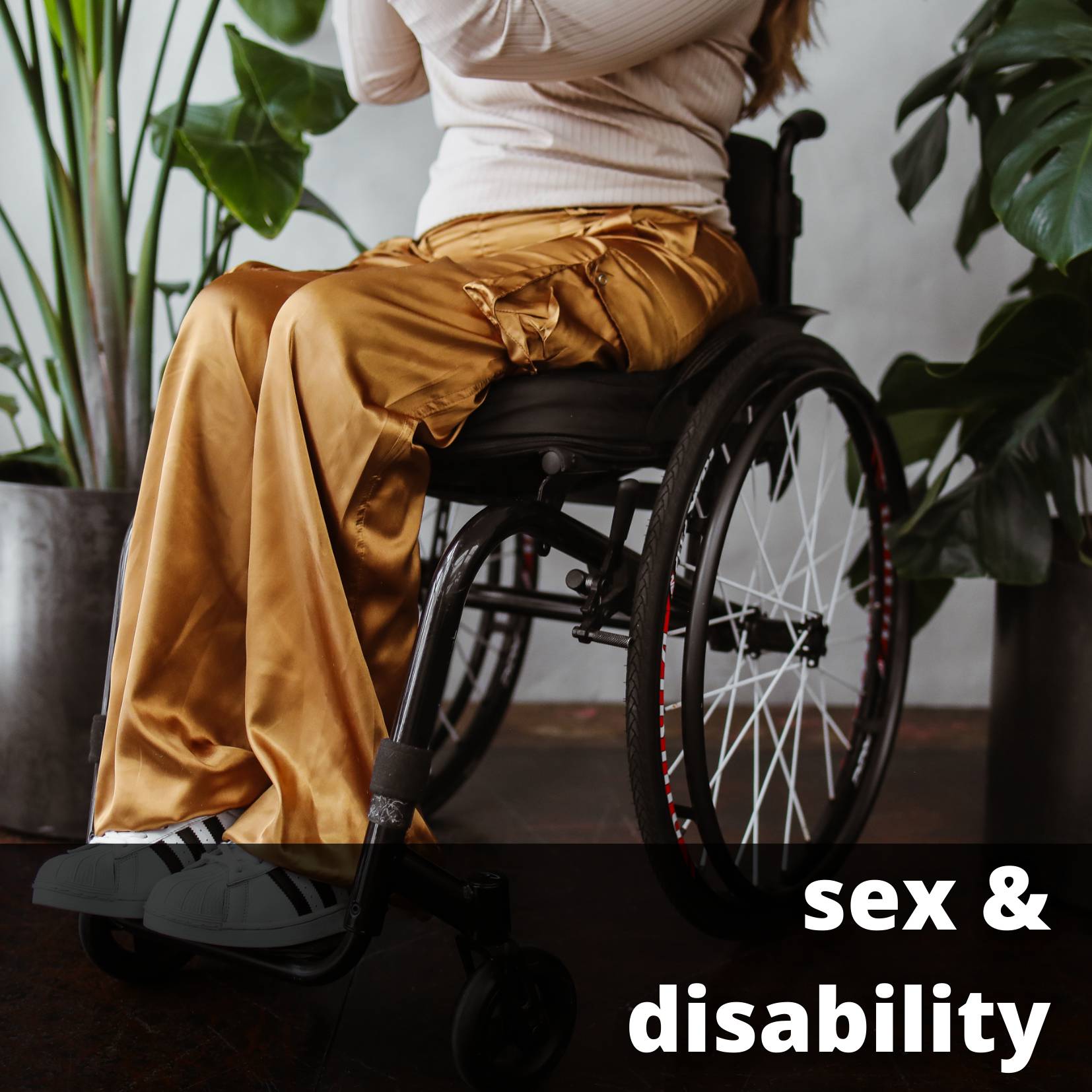Blog
Permanent link for Sex and Disability on April 14, 2021
Part of our Sex-Ed Series
*Please note that the writer identifies as able-bodied, so she has included a list of influencers and educators to follow on Instagram that have lived experiences with disability and sex.
In the United States, 61 million adults live with a disability. According to the CDC, a disability is “any condition of the body or mind that makes it more difficult for the person with the condition to do certain activities and interact with the world around them.” According to the World Health Organization, disability has three dimensions:
- Impairment in a person’s body structure or function, or mental functioning; examples of impairments include loss of a limb, loss of vision or memory loss.
- Activity limitation, such as difficulty seeing, hearing, walking, or problem solving.
- Participation restrictions in normal daily activities, such as working, engaging in social and recreational activities, and obtaining health care and preventive services.
People living with disabilities are often grouped into a single population, even though there is a wide variety of experiences with disabilities. Socially, those with disabilities are seen as asexual beings without feelings, desires, and needs outside of their disability, all 61 million of them. But let’s set the record straight: a disability does not define an entire person. People with disabilities can be and are sexual beings!We want to debunk some myths about sex and disability.
Myth #1 - People with disabilities can’t have sex.
American society often tends to define sex in one way:
penis-in-vagina intercourse. However, there is no such thing as real
sex, right sex, or wrong sex. Sex is not exclusively penis-vaginal
penetration; it is so many
different things, because every body and everybody is different.
Sex is for everyone and anyone who chooses to participate - as long as
it’s consensual.
Depending on a person’s disability, there may be some planning
involved in making sure everyone is comfortable during sexual
activity. For example, some people with physical disabilities choose
to use devices like a
liberator wedge to help with body support during sex. Or, as
another example, there might need to be discussions about when or how
to have sex if chronic pain or fatigue are a part of a person’s
disability experience. Having open and honest conversations to make
sure you are getting what you need is vital - whether you have a
disability or not!
Myth #2 - People with disabilities only have sex with each other.
Nope! A person is not their disability, and it does not decide
who they can and cannot have a sexual relationship with - as long as
it’s consensual, safe, and enjoyable!
Myth #3 - People with disabilities aren't sexy.
It’s important to understand that attraction is based on a
connection between people, not a
beauty or “sexy” standard our society has set. (Westernized
beauty standards could be another whole blog series!) What people find
sexy differs and is usually more than strictly someone’s outward
appearance. It could be their sense of humor, smell, intellect, touch,
love of dogs, and so much more. Although, wearing something sexy can
also make a person feel more confident and sexier too, so it’s okay to
explore that too! For individuals with physical disabilities, finding
certain clothing that makes you feel sexy and confident can be harder,
but it’s possible! An online shop called Elba London
creates bras for people with mobility or dexterity limitations, and Intimately has adaptive bra and
lingerie options, too.
Myth #4 - People with disabilities do not crave sex.
There is a common misconception that individuals with
disabilities are child-like and therefore do not desire sex or have
sex; this is simply not true! Sexuality is a vital part of being
human. It
is physical, emotional, intellectual, social, and cultural.
Every person experiences sexuality in their own way, but they
experience it with or without disability. No matter who you are, the
decision to have sex is a personal choice, and whether you crave sex
differs from person to person.
Myth #5 - People with disabilities don’t need sex education.
Understanding sexual health is extremely important, whether you
choose to have sex or not. Being aware of STIs,
pregnancy, contraception, and overall safety is key. All people should
have access to resources and tools that make sex safer, healthier, and
enjoyable if they choose to engage. We know the U.S.
has not done a good job of providing comprehensive sex
education, and we’ve done even worse in providing specific age and
ability appropriate resources to people with disabilities so that they
can experience fulfilling sex lives. Also, it’s important to note that
comprehensive sexual education can better
equip individuals with disabilities to resist sexual violence, abuse
and coercion in social spaces. Sex education is for everyone!
Learning from those with Lived Experiences
Let’s repeat this because it is so important: people with
disabilities are sexual beings!
While, as an able-bodied person, I cannot understand having a disability and navigating sexuality and sex, I can learn from those with lived experiences. Here is a list of some amazing educators and influencers that speak directly to their experiences with sex and disability that you should follow if you want to learn more!
Follow these people on Instagram:
- @crippingupsex
- @andrewgurza_
- @rvbyallegra
- @aaron___philip
- @the_feeding_of_the_fox
- @thedisabledhippie
- @carson_tueller
While I spoke a lot about physical disabilities, you could also take a peek at this Australian blog post on cognitive disability and sexuality if you’re interested in learning more.
By: Annie Seeber, WIT Peer Educator
Categories:
Sexual Health
Posted
on
Permanent link for Sex and Disability on April 14, 2021.

